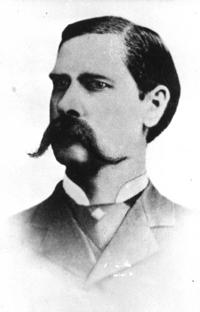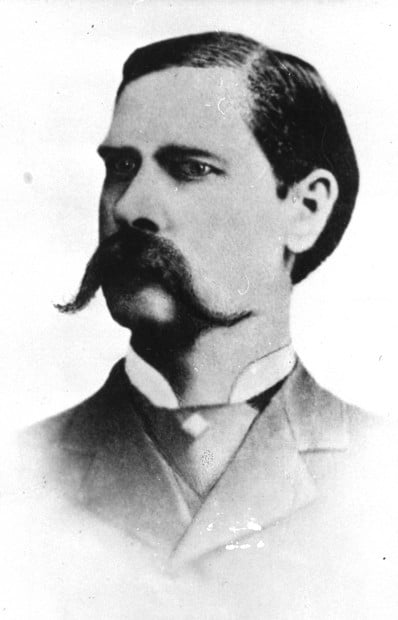Whether he is thought of as a hero of the "Wild West" or a corrupt, murderous lawman unfit for the badge, there's no question Wyatt Earp contributed to the legend of Tombstone and the west. He died 87 years ago, on Jan. 13, 1929, in Los Angeles.
After being accused in the murder of Frank Stillwell in Tucson, Earp, unwilling to face a trial, fled Arizona and was never tried for the murder.
From the Arizona Daily Star, Jan. 14, 1929:
DEATH REACHED LAST OF EARPS IN COAST HOME
Famous Gun Toting Officer Of Tombstone Dies With Boots Off
BRAVERY IS PRAISED
Breakenridge Tells of Old Days When He knew Famous Family
LOS ANGELES, Jan. 13.—(AP)—Wyatt Earp, gun-toting peace officer of Dodge City, Kansas and Tombstone, Ariz., frontier days, whose colorful career led him through a dozen fatal conflicts with “bad men” of the old west, died here today. He was 78 years old. (Morgue Lady’s note: Many sources put his age at 80 or 81 when he died.)
Wyatt Earp, and Virgil, Morgan and Jim, three brothers, together with Doc Holiday were principal figures in the stormy days of Cochise county, Arizona, where Tombstone is located. Their conflict with the Clanton gang of cowboys, shortly following which Morgan Earp was killed from ambush, and during which two famous gun-men died, was followed by an investigation. The Earps, led by Wyatt, then a deputy United States marshal, were exonerated on the grounds that they had acted as peace officers.
Wyatt Earp gained renown when he was chosen as referee of the Tom Sharkey-Bob Fitzsimmons fight in San Francisco. Earp wore a six-shooter in the ring, and no protest was heard after his decision in favor of Sharkey was given.
Famous Friends
Among the friends of Earp were listed such figures as Bat Masterson, Wild Bill Hickock, and other famous figures of the early west. In Alaska during the gold rush Earp met Bill Hart, western motion picture hero, Wilson Misner, playwrite, and the late Tex Rickard, all of whom were close friends.
Wyatt Earp had been ill for some time. He left his bed the day before Rickard died to visit Misner and to send a telegram to his sick friend in Florida. The exertion caused a relapse.
Earp leaves a widow, and a niece, the daughter of Virgil Earp, who died in Oakland, Cal., several years ago. The funeral will be held Tuesday.
COL. BILLY BREAKENRIDGE RECALLS EARP’S BRAVERY
“Well, well! Wyatt’s dead. That’s the last of the Earps!” former deputy United States marshal and two-gun man of Tombstone’s “Helldorado” days, was thusly epitomized by Colonel William “Billy” Breakenridge, “than whom there is none than whomer” as far as a reconteur of the early days of the mining camps are concerned.
Found in Room
Breakenridge was found in his room at the Old Pueblo club. He was in bed but had not retired. His first impulse upon learning of the death of Earp was to go to Los Angeles for the funeral, he said, but on a moment’s consideration decided that the trip would be too much for him at present. He only recently returned from the coast, and has for the past few days been confined somewhat by a cold.
“There were five of the boys,” Colonel Breakenridge said, speaking of the Earp family. “They were, Virgil, the city marshal; Wyatt, the deputy city marshal, and also deputy United States marshal; Morgan, the policeman—all of whom lived in Tombstone; and there was Warren, who lived over in Willcox. Besides those four there was the half-brother, Jimmie, who died at that time. (Morgue Lady's note: James Earp died in 1926.)
The colonel had much praise for Wyatt, and said, “He made a good officer and was noted as a brave man. All the while he was in Tombstone he held office of some kind, either in the United State’s marshal’s office or with the city.”
Colonel Breakenridge is the author of a recent book on Tombstone’s “true story”—“Helldorado.” The book is probably the most accurate historically of any published about the mining camp, critics have said. In that book the colonel has much to say of the Earps, and the days when Wyatt Earp was a peace officer are there retold for the benefit of all who care to read.
The colonel closed with the statement that Wyatt Earp was “very loyal and true to his friends. He got into a good deal of trouble because of that loyalty.”
The tone of articles in the Star during Wyatt Earp's heyday was quite different. Editorials condemning him were fairly common until it was clear he would not return to Arizona and face justice.





